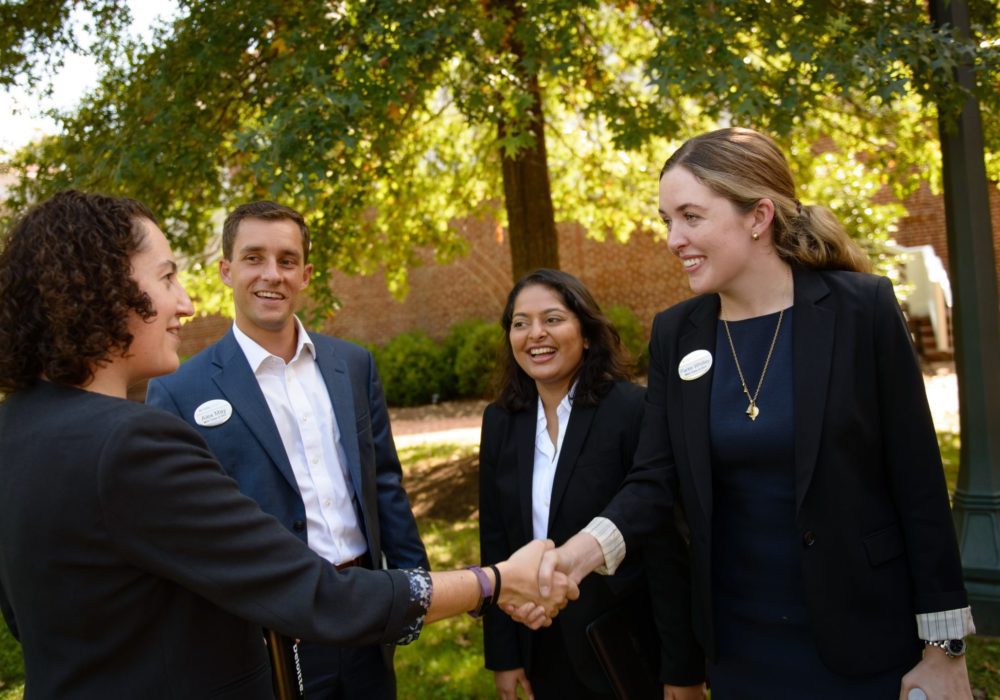The case interview: It’s an exercise that might instantly strike fear and anxiety into the heart of any MBA student preparing for internship and full-time job interviews. Luckily, with the help of Darden’s career coaches, case interview experts and Senior Directors Jenny Zenner (MBA ’03) and Christy Gunville, the case interview doesn’t have to be overwhelming. Together, Jenny and Christy provide an introduction to the interview format used by an increasing number of companies and share frameworks fundamental to tackling this interview technique.
What is a case interview?
Christy explains that in a case interview, candidates receive a specific question designed to evaluate competencies required by the job, and generally fall into key categories that include technical expertise, quantitative skills, strategy, market sizing, creative problem-solving, and business situations. Case questions vary, ranging from highly specific to industry and job function, to broad, cross-industry and ambiguous.
1. Do your homework.
Before a case interview, Jenny encourages First Year students to speak with Second Years who interned with the company and alumni who work there now, and use research tools like Employment Data System (EDS).
More than anything else, Christy emphasizes that you need to know the company inside and out. For a consumer packaged goods company, she recommends going to a grocery store to examine product, placement and pricing.
“Immerse yourself in the experience of being a customer,” Christy says. “What are their day-to-day challenges? If you’re not having fun learning about what they’re selling, it might not be the best role for you.”
2. Make sure you understand the question being asked.
Once an interviewer has outlined a case for you, paraphrase what is being asked and repeat it back to the interviewer. This tactic is especially important if you hear metrics and terminology you don’t recognize.
“It’s a great opportunity to demonstrate collaboration,” Christy points out.
Or, as Jenny says, “The interviewer might say ‘15’ and you hear ‘50’ on a phone call or in a virtual interview. Go ahead and ask the question to clarify.”
3. Be prepared for anything.
Jenny tells a story of a student spontaneously asked by interviewer to whiteboard a concept, simply because the board was in the room. It’s all fair game, she says — especially when it comes to your resume.
“If you list a competency in SQL, be prepared to get a SQL question,” Jenny says. “Don’t be flustered that on the spot, you could be asked to demonstrate a data competency, for example.”
4. Take time to organize your thoughts.
The length of the pause you take to answer a question can vary greatly; if you receive an abstract question, take a full minute to determine how to approach it. If it’s a straightforward question, though, limit your pause. Let the interviewer know that you’re going to take a moment to prepare your answer, too. Jenny warns against typing furiously on a laptop during a virtual interview, however.
“In a phone or video interview, have all the notes in the world at your disposal. Bring your frameworks, blank paper and pens,” says Jenny.

5. Brainstorm creatively.
“Company research comes into play here,” Christy says. “Don’t feel you need to hold back because the person across from you is an expert. They want you to go out on a limb and share great ideas.”
She encourages students to stay coachable and pay attention to guidance from interviewers. “Brainstorm in a structured fashion. Responses can become rambling — be specific and know when to end,” says Christy.
6. Stay calm under pressure.
The case interview is intended to test your ability to think on your feet and adapt based on new information. Interviewers want to know that you can handle yourself in a situation that is uncomfortable.
“An interviewer could create a pressure-cooker environment on purpose,” Jenny explains and encourages students to build rapport regardless of whether the interviewer is playing “good cop” or “bad cap”.
“Any interview is recoverable. If you get flustered, show the ability to gather yourself. Get back in the moment and be physically present.”
7. Expect that you’re going to make a mistake or two.
Remember it’s not about whether you arrive at the right answer; it’s more important to demonstrate your thought process and approach to problem solving. Jenny emphasizes that it’s a hard shift for MBA students to make, especially after preparing for the GMAT or GRE.
“Many case interview questions are hypothetical. The more structure you provide rather than ramble, the better,” Jenny says.
“You are going to make mistakes and that’s OK,” says Christy. “Just don’t get flustered.”
8. Summarize your findings clearly.
At the conclusion of your case, be sure to identify and synthesize key insights you’ve arrived at during your interview and share them with your interviewers. Review your findings and consider additional risks and next steps.
9. Understand that different companies have different rubrics.
Every company has a different measurement of success in a case interview. Jenny references Google’s search for “Googleyness” in its candidates. Most importantly, companies want to know the business toolkit you’ve amassed since being at Darden, and whether you’re ready to employ that.
“Communication and presence requires practice,” Christy says.
10. Have fun!
Sure, it sounds like the farthest thing away from “fun,” but Christy and Jenny both highlight the need to bring positive energy and enthusiasm to every case interview.
“We can’t emphasize excitement enough. Interviewers want to see your excitement for what they do day-in and day-out,” Christy says. “It shows that you’re going to like being in this role. That level of interest and engagement needs to come across. Be excited about business challenges they’re trying to tackle.”





